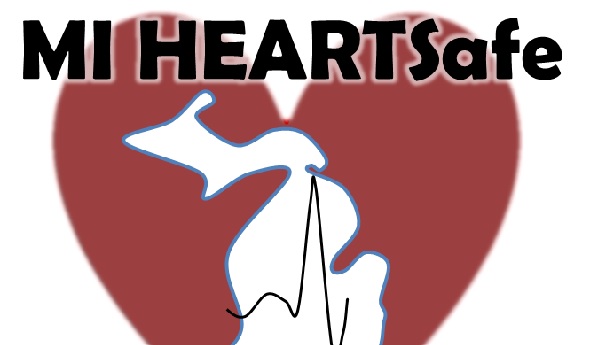
122 Schools Recognized as HEARTSafe
May 15, 2015
The Michigan departments of Health and Human Services (MDHHS), and Education (MDE); American Heart Association (AHA); Michigan High School Athletic Association (MHSAA); and Michigan Alliance for Prevention of Sudden Cardiac Death of the Young (MAP-SCDY) have awarded 122 schools in Michigan with the MI HEARTSafe School designation which recognizes schools that are prepared to respond to cardiac emergencies.
“Sudden cardiac death claims the lives of more than 300 Michigan children and young adults between the ages of one and 39 years of age each year,” said Dr. Eden Wells, chief medical executive of MDHHS. “Implementation of CPR and an automated external defibrillator (AED) within 3-5 minutes is crucial for increasing the chance of survival. Cardiac arrest is often unexpected and frightening, and I’m pleased to see so many of our schools taking preventative measures to address this health issue.”
Between 1999 and 2009 in Michigan, there were 3,134 young individuals between 1 and 39 years of age who died of sudden cardiac death. Of those, 246 were between 5 and 19 years of age. In its second year, the MI HEARTSafe Schools designation is Michigan’s commitment to reducing the number of sudden cardiac death in our youth. Last year was the first year of the program, and 40 schools were designated in Michigan.
“MDE is proud to support MI HEARTSafe schools,” said State Superintendent Mike Flanagan. “Ensuring schools are prepared for sudden cardiac emergencies through planning, training, and AEDs is an important part of having safer learning environments for students, staff, and the community.”
Public Act 12 of 2014 requires all schools (grades kindergarten to 12) to have a cardiac emergency response plan in place. This designation recognizes 122 schools that have taken steps above and beyond to prepare to respond in the event of a cardiac emergency, and is awarded for a period of three years. Click for the list of designated schools.
“The Michigan High School Athletic Association is proud to partner with the state of Michigan to promote the MI HEARTSafe Schools program,” said Jack Roberts, executive director of the Michigan High School Athletic Association. “It’s important we all do our part to help schools prepare for unexpected emergencies to keep children in our communities safe.”
In order for a school to receive a MI HEARTSafe designation, it must perform at least one cardiac emergency response drill per year, have a written medical emergency response plan and team, have current CPR/AED certification of at least 10 percent of staff, have accessible, properly maintained and inspected AEDs with signs identifying their location and ensure pre-participation sports screening of all student athletes using the current physical and history form endorsed by the Michigan High School Athletic Association.
Schools that meet all of the requirements will be able to apply for the MI HEARTSafe School designation each year. Click for more information about the MI HEARTSafe Schools program.

Eight Members Elected to MHSAA Representative Council
By
Geoff Kimmerly
MHSAA.com senior editor
September 26, 2024
Elections were completed recently to fill positions on the Michigan High School Athletic Association’s legislative body, its Representative Council, with seven members receiving re-election from their respective constituencies and one new member selected to join the Council beginning with its Fall meeting this December.
Four of the seven re-elected members ran unopposed. Midland athletic director Eric Albright was re-elected to continue representing Class A and B schools in the northern section of the Lower Peninsula, and Portage Northern athletic director Chris Riker was re-elected to continue representing Class A and B schools in the southwestern section of the Lower Peninsula. Bangor athletic director Fredrick J. Smith was re-elected to represent junior high and middle schools, and Vic Michaels, director of physical education and athletics for the Archdiocese of Detroit, was re-elected to continue representing private and parochial schools.
Winning re-election by majority votes were Harbor Springs athletic director Anna Rigby to continue representing Class C and D schools in the northern section of the Lower Peninsula, Brighton athletic director John Thompson to continue representing Class A and B schools in the southeastern section of the Lower Peninsula, and Calumet faculty member and past athletic director Sean Jacques to continue representing Class C and D schools in the Upper Peninsula.
Fenton High School principal Michael Bakker was elected for the first time, for a statewide at-large position. He ran unopposed.
All eight were elected to serve two-year terms.
The Representative Council is the 19-member legislative body of the MHSAA. All but five members are elected by member schools. Four members are appointed by the Council to facilitate representation of females and minorities, and the 19th position is occupied by the Superintendent of Public Instruction or designee. The Council meets three times annually. Five members of the Council convene monthly during the school year to form the MHSAA’s Executive Committee, which reviews appeals of Handbook regulations by member schools.
Additional elections took place to select representatives to the Upper Peninsula Athletic Committee. Lake Linden-Hubbell athletic director and varsity girls basketball coach Jack Kumpula was re-elected to represent Class D schools. West Iron County High School and Middle School principal, athletic director and varsity football coach Mike Berutti was re-elected to represent high school athletic coaches.
The MHSAA is a private, not-for-profit corporation of voluntary membership by more than 1,500 public and private senior high schools and junior high/middle schools which exists to develop common rules for athletic eligibility and competition. No government funds or tax dollars support the MHSAA, which was the first such association nationally to not accept membership dues or tournament entry fees from schools. Member schools which enforce these rules are permitted to participate in MHSAA tournaments, which attract more than 1.4 million spectators each year.

